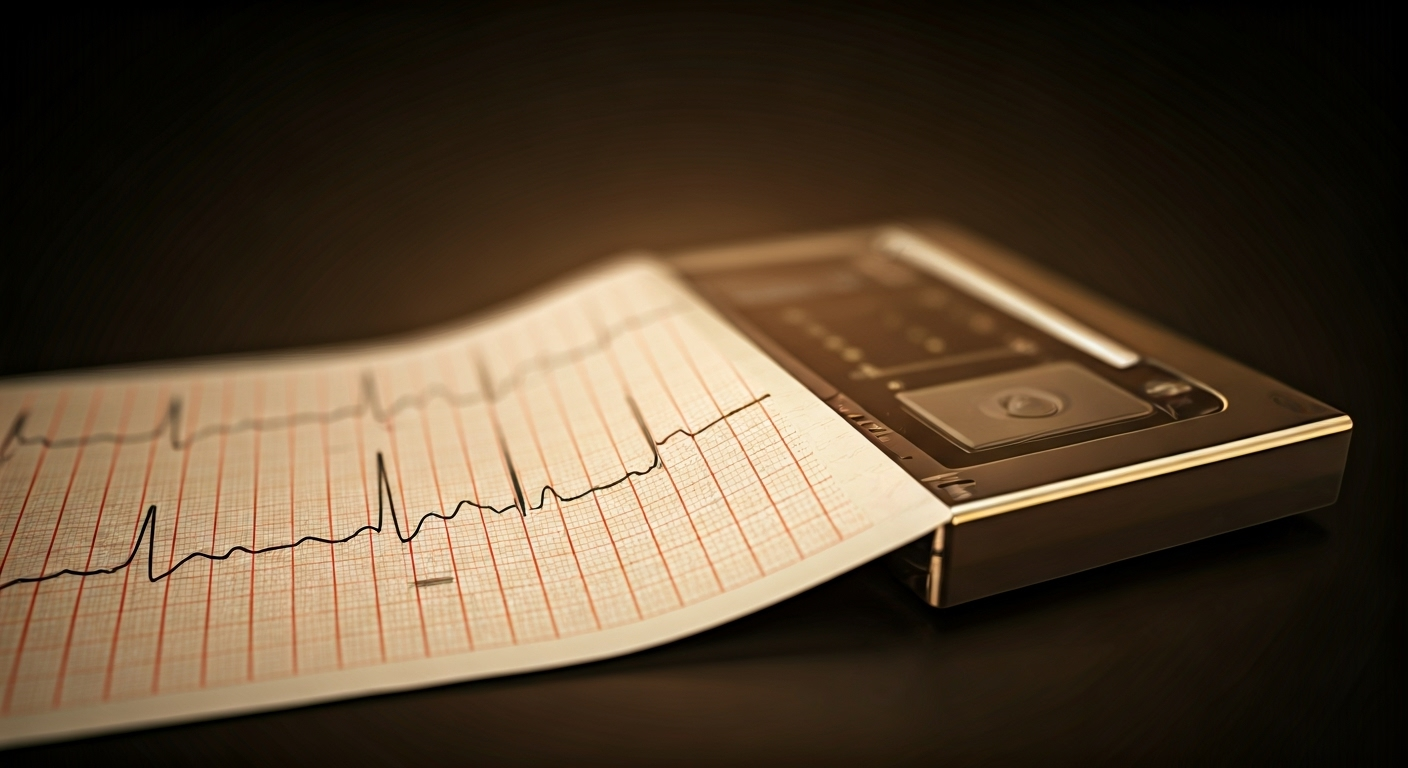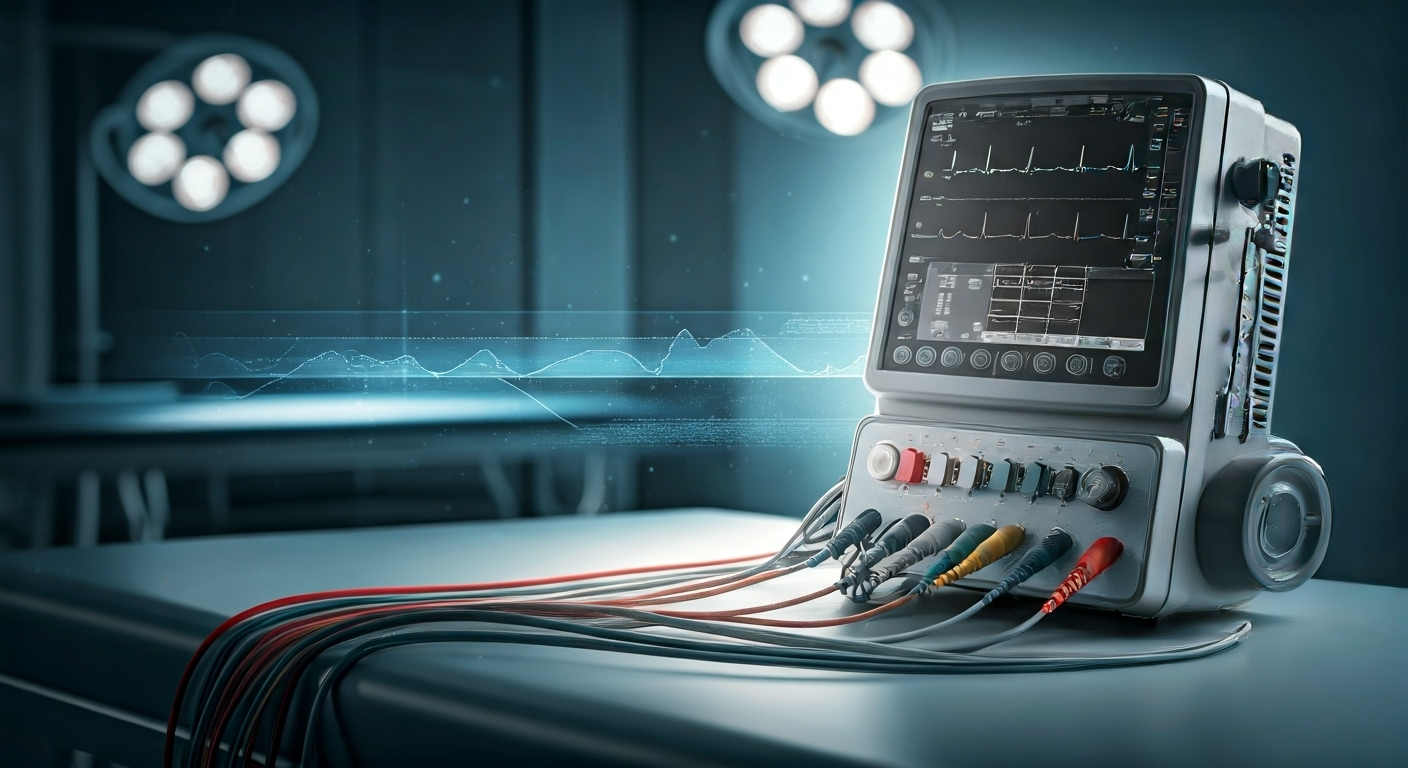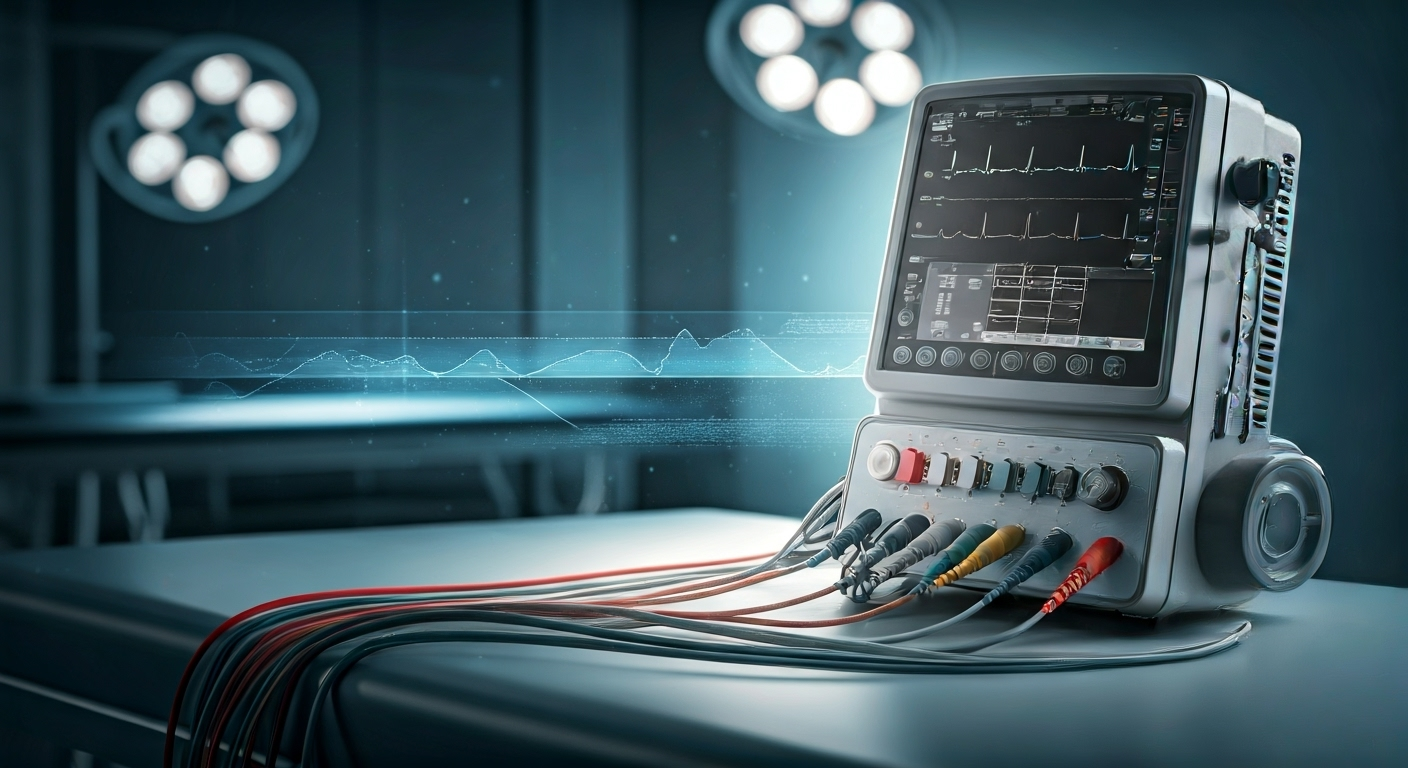
Key Highlights
- ECG machines are essential for detecting heart rhythm abnormalities, including atrial fibrillation and heart attack, in clinical and at-home settings.
- These devices measure electrical impulses from the heart via electrodes, providing accurate readings for medical professionals and patients alike.
- Different ECG machine types—resting ECG, stress test, Holter monitor, and portable ECG device—each serve unique diagnostic functions.
- Advances such as AI integration and wireless connectivity are enhancing heart monitor efficiency and analysis.
- Holter monitors offer continuous monitoring for irregular heart rhythms outside clinical environments.
- Timely use of ECG devices helps healthcare teams intervene early, minimizing risks and improving patient outcomes.
Transitioning from these highlights, let’s explore the foundation and working principles of ECG machines and their critical role in heart condition diagnosis.
Introduction
It is important for people to know about heart health these days. An ECG machine helps a lot, as it shows the heart’s electrical impulses and how it works. This tool lets doctors and other healthcare workers spot signs of heart disease and other cardiac conditions. They look at waveforms from the machine to check for abnormalities like arrhythmias. This test is not invasive, and it helps clinicians track heart rhythms in check-ups. The ECG also helps quickly in emergency cases where fast information is needed about your heart.
What Is an ECG Machine and How Does It Work?
 An ECG records the electrical activity of the heart by using electrodes that stick to the skin. The ECG takes these signals and makes waves that show the heart rhythm and its health. Clinicians use these readings to know if there be arrhythmias, a heart attack, or other problems with the heart.
An ECG records the electrical activity of the heart by using electrodes that stick to the skin. The ECG takes these signals and makes waves that show the heart rhythm and its health. Clinicians use these readings to know if there be arrhythmias, a heart attack, or other problems with the heart.
Principle of Electrocardiography Explained
Electrocardiography works by picking up the electrical impulses from the heart to watch how the heart is doing. The way it works is that electrodes are put on the skin. These grab the heart’s electrical signals and turn them into waveforms called ECG signals. The waveforms show the heart’s rhythm and heart rate, so healthcare professionals can see if there are problems like arrhythmias or other cardiac conditions. The electrocardiogram (ECG) lets clinicians look for abnormalities and helps them check how treatments are working. The ECG makes it possible for clinicians to get useful information about the heart, and their work depends on it being clear and simple to use for both tests and ongoing care.
Components and Setup of an ECG Device
Essential parts of an ECG device are the electrodes. These capture the electrical signals from the heart. The lead wires then carry these signals to the ECg machine. The device uses these inputs to show a picture of heart activity called an electrocardiogram. To set up, you place the electrodes on certain spots on the body. This helps make sure there is good skin contact for accurate readings of heart rhythm and electrical signals. Most times, an intuitive user interface helps healthcare workers with the setup. This makes it easier to record heart rhythm and other important data.
Types of ECG Machines Used in Healthcare
There are different types of ECG machines for different needs in healthcare. Resting ECG machines are used to check the heart’s electrical activity when the body is at rest. This helps doctors find heart problems. Stress test ECG machines show how well the heart works when a person is active. These machines can help spot abnormal heart rhythms and other heart problems. Portable ECG devices are easy to carry and use, so people can keep track of their heart health outside the clinic. Knowing about these types helps healthcare workers use the right ECG. It can make care better for people in many places.
Resting ECG Machines: Key Features and Use Cases
Resting ECG machines help doctors find heart problems by checking the electrical activity of the heart when you are resting. The machine uses electrodes to measure this activity. On the screen, you will see waveforms that show how your heart beats. This helps find things like arrhythmias and atrial fibrillation. Hospitals and clinics use ECG machines a lot. The user interface is easy, so healthcare workers can get accurate readings fast. When people have chest pain, palpitations, or dizziness, a resting ECG can be part of a regular check-up. It helps people feel better about their heart health and gives peace of mind.
Stress Test ECG Machines: When and Why They’re Used
Stress test ECG machines are important for checking how the heart works when the body is active. These devices keep track of the electrical activity of the heart while a person exercises. They pick up ECG signals to show how the heart deals with stress. Doctors use them mostly to find problems like arrhythmias and coronary artery disease. The machines let clinicians look for changes in heart rate and spot any abnormalities. With accurate results, they help give good information to doctors. This helps healthcare teams make strong plans for treating people who may have heart issues.
Holter Monitors vs. Standard ECG Machines
Holter monitors record your heart’s electrical activity all day for 24 hours. They help check for changes in heart rhythm such as arrhythmias or abnormalities. This can be useful if someone has chest pain or shortness of breath.
By comparison, standard ECG machines give a quick check called a resting ECG. They look at your heart’s activity for just a few seconds. The difference is that Holter monitors show changes over time, which gives more details about your heart. Standard devices are good when doctors want fast answers.
Both tools help us learn about the heart, but Holter monitors can find problems that quick checks might miss.
Portable and Handheld ECG Devices: Advantages and Limitations
Portable ECG devices are easy to carry and use. They help both healthcare workers and people at home to check their heart rhythm anytime. With good ease of use, these devices give accurate readings for things like atrial fibrillation or other heart abnormalities.
Compared to regular ECG machines, portable and handheld devices have fewer data channels. This can mean lower accuracy when measuring complex waveforms. Even with these issues, their portability and quick use make them good tools for healthcare at home and in emergency times.
Applications of ECG Machines in Clinical Practice
ECG machines are important in clinical practice for helping to find and check cardiac conditions. The devices let healthcare workers see the electrical activity of the heart. This helps doctors spot things like atrial fibrillation or arrhythmias. ECGs are also helpful in emergency care. They can quickly check patients who have chest pain or shortness of breath. These machines are used in home healthcare and telemedicine too. This helps people watch their heart regularly and gives peace of mind. It is useful for patients who need to manage heart problems all the time.
Usage in Hospitals and Emergency Settings
In hospitals and in emergency rooms, ECG machines help doctors find and watch for heart problems. Medical professionals use the ECG to catch the electrical activity of the heart. These accurate readings help them spot arrhythmias, heart disease, or sudden issues like heart attacks. With the ECG signals shown in real time, healthcare workers can act fast when someone gets chest pain or shortness of breath. This lets them make quick decisions for treatment and can improve patient outcomes.
ECG Monitoring in Home Healthcare and Telemedicine
In today’s healthcare, ECG monitoring is very important for people at home and those using telemedicine. You can now use small ECG devices to watch your heart’s rhythm and spot anything that seems off. This helps give you peace of mind and is easy to use. With these devices, it’s possible for you to check your heart all the time. The data goes into your electronic medical records (EMR), so your doctor can get up-to-date details to help make good choices for your care. These devices are made with ease of use in mind. If you have chest pain or palpitations, you can take quick action. This supports better heart health for all and helps you stay in control of your healthcare.
Essential Buying Considerations for ECG Machines
Choosing an ECG machine is a big decision in healthcare. You need to look at some main things. The number of channels on the ECG is important. It helps make readings more accurate. It also helps to find arrhythmias faster.
Ease of use matters a lot too. The machine should have an intuitive user interface. This helps both the people who use it at work and those who use it at home.
Pricing is another thing to think about with an ECG machine. You want the best value for money. It’s good to check what warranty you get, since that will help you feel better for the long term.
You should also look at portability. The machine needs to be easy to move. This is useful for home use and telemedicine. Make sure you pick an ECG that is right for your healthcare needs.
Comparison Table: Types, Features, and Pros/Cons
A simple look at different types of ECG machines shows that each one is made to fit certain needs. Resting ECG machines are known for their ease of use and accurate readings. Their tools are easy for people to use. But, they may not be easy to move from one place to another.
Stress test ECG machines are good at checking heart health when you are working out or moving. These, though, can take more time and steps to set up.
Holter monitors are helpful for tracking your heart over a long time. They can find abnormal heart rhythms that only show up from time to time.
Portable ECG devices are made for home use. They are easy to carry, but they may have fewer data channels and lack some advanced features.
Every type of ECG has its own way of balancing what it can do and how easy it is to use and move around. These choices also affect pricing and the type each healthcare worker will want.
Factors to Evaluate: Channels, Compliance, Warranty, Cost
When you choose an ECG machine, there are many things you need to think about. The channels of data inside the ECG help the machine to be accurate. This makes sure it can find heart rhythms and spot any abnormalities better. Some machines are FDA approved, and this is important for safety and for getting good results you can trust. Warranty choices can help you feel peace of mind, because you know that your investment is protected. Pricing is different for each ECG model. So, you should look for one that has the advanced features you need for healthcare while also fitting your budget.
Conclusion
ECG machines play a big role in checking and handling many cardiac conditions. These devices help record the heart’s electrical activity. This lets healthcare workers find problems or abnormalities in the heart. The machines can be used as a resting ECG by clinicians or as a portable device for home use. Every type fits a certain need in clinics and at home. When patients and clinicians know how the machines work, it gives more peace of mind for those worried about heart health.
Frequently Asked Questions
Are wireless or Bluetooth ECG machines reliable?
Wireless or Bluetooth ecg machines can be reliable if they follow industry standards and pass careful testing. The way they connect helps to send data right away. This makes monitoring better. Still, people should think about things like how long the battery lasts and if the signal stays strong. This will help keep the machine working well when you use it.
What maintenance and calibration do ECG machines require?
Regular maintenance of ECG machines is important. This includes cleaning, checking the battery, and updating the software. Calibration matters because it helps make sure the device’s readings match set standards. Getting regular help from a professional can stop problems from happening. It also helps the ECG machine last longer and keep working well in clinics.
Is it safe to use refurbished ECG machines for patient care?
Using refurbished ECG machines can work for patient care if the machines are certified, kept in good condition, and come with a warranty. But, before you use these machines, it is important for you to check how well they work and how reliable they are. This is the best way to make sure patients stay safe and you get accurate results in the clinic.
What is an ECG machine used for?
An ECG machine is used to measure the electrical activity of the heart over time. It helps diagnose various heart conditions, such as arrhythmias, heart attacks, and other cardiac abnormalities. By providing a graphical representation of heart rhythms, it plays a crucial role in patient monitoring and treatment planning.

